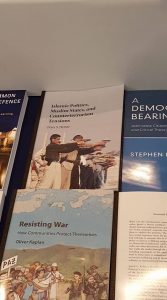 I present my argument on how religion affects international through religion-state connections most comprehensively in my book, Islamic Politics, Muslim States and Counterterrorism Tensions, which was published by Cambridge University Press. The book is now available in paperback, making it affordable for students and the general public. You can find more information on the book in these interviews (with Research on Religion and START). Additionally, you can learn more from this review of the book in International Affairs: International Affairs review
I present my argument on how religion affects international through religion-state connections most comprehensively in my book, Islamic Politics, Muslim States and Counterterrorism Tensions, which was published by Cambridge University Press. The book is now available in paperback, making it affordable for students and the general public. You can find more information on the book in these interviews (with Research on Religion and START). Additionally, you can learn more from this review of the book in International Affairs: International Affairs review
In this book, I analyze the role religion played in Muslim states’ cooperation with the United States on counterterrorism. I find that the nature of the religion-state connection has a significant effect on states’ counterterrorism policies, with closer religion-state ties leading to less freedom of action for regimes and decreased counterterrorism cooperation. It includes a large-n statistical analysis of all Muslim states and case studies of Pakistan, the United Arab Emirates and Turkey. The book expands our understanding of Muslim states’ reactions to the US Global War on Terror, and applies this to other issues with a concluding discussion of the Arab Spring and campaigns against the Islamic State terrorist group. I also can speak to broader debates in the study of religion and international affairs, by highlighting the importance of religion-state ties in understanding this topic.
The book includes an introduction that presents the empirical and theoretical puzzles I will address, existing views on this topic, and a general overview of the book. Two theoretical chapters follow, the first generally discussing my theory on religion and international relations and the second focusing specifically on what this means for counterterrorism. The second theoretical chapter also presents my research design.
Four empirical chapters follow the theoretical discussion. The first is a large-n analysis of all Muslim states, presenting the quantitative findings in an accessible manner (with technical details available in an appendix). I then present case studies on Pakistan, Turkey, and the United Arab Emirates. Each case study provides an overview of Islamic politics in the country, the nature of the relationship between religion and state (both currently and over the country’s history), and how this influenced their counterterrorism policies.
The book concludes by reviewing my argument and discussing its significance. I highlight how it can speak to debates on religion and international relations, US power, and international hierarchy. I also expand my argument, applying it to changes in Turkey under the Erdogan government and Middle Eastern politics after the Arab Spring.
In the book, I deal with important academic theories but also try to keep the writing accessible for non-academic audiences. As a result, it should be of interest to scholars, policymakers and the general public with an interest in these topics. Additionally, it could be a good text for upper-level undergraduate or graduate courses on religion and politics, terrorism, the Middle East, or South Asia.
